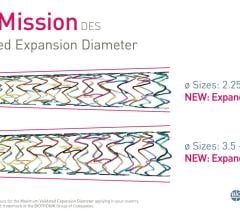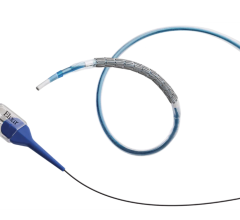March 13, 2008 – Abbott’s fully bioabsorbable drug-eluting stent for the treatment of coronary artery disease demonstrated no stent thrombosis, no clinically driven target lesion revascularizations and a 3.3 percent rate of major adverse cardiac events (MACE) in 30 patients out to one year, according to data from the ABSORB clinical trial published in The Lancet on March 13, 2008.
The one-year results for Abbott’s bioabsorbable everolimus eluting stent were said to be consistent with performance demonstrated by the system at six months. Abbott’s prospective, non-randomized, ABSORB clinical trial is designed to evaluate the overall safety and performance of a fully bioabsorbable everolimus eluting stent out to 5 years.
"Abbott’s bioabsorbable everolimus eluting stent has demonstrated excellent clinical safety out to one year in patients with coronary artery disease," said Patrick W. Serruys, M.D., Ph.D., professor of Interventional Cardiology at the Thoraxcentre, Erasmus University Hospital, Rotterdam, and co-principal investigator in the ABSORB study. “The positive results from this clinical trial form a strong basis for the development of additional bioabsorbable stent platforms with the potential to eliminate some of the restrictions posed by metallic stents in areas such as vessel imaging and vessel remodeling.”
At six months, the overall MACE rate in the ABSORB trial was 3.3 percent (one patient, n=30) and late loss, a measure of reduction in vessel lumen diameter after stenting, was 0.44 mm. At one year, the overall MACE rate in the ABSORB trial was consistent with results at six months (one patient, 3.3 percent, n=30; 3.4 percent adjusted for one patient who withdrew from follow-up, known to be event free at 1 year, n=29). MACE is a composite measure of cardiac death, heart attack and retreatment of a diseased lesion (ischemia-driven target lesion revascularization) in the ABSORB trial. Abbott’s bioabsorbable everolimus eluting stent reportedly demonstrated 100 percent procedural success and 94 percent device success in the ABSORB trial.
Abbott is the only company with a fully bioabsorbable drug eluting coronary stent in clinical trials. Abbott’s bioabsorbable everolimus eluting coronary stent is made of polylactic acid. As with a metallic stent, Abbott’s bioabsorbable stent is designed to restore blood flow in clogged coronary arteries and to provide mechanical support until the blood vessel heals. Unlike a metallic stent, however, a bioabsorbable stent is designed to be slowly metabolized by the body and completely absorbed over time.
The ABSORB trial is a prospective, non-randomized (open label) study designed to enroll up to 60 patients in Belgium, Denmark, France, New Zealand, Poland and The Netherlands. Key endpoints of the study include assessments of safety – MACE (defined as any event that resulted in re-treatment of a diseased artery, heart attack or cardiac death) and stent thrombosis (blood clot formation) rates – at 30, 180 and 270 days, with additional annual follow-up for up to five years, as well as an assessment of the acute performance of the bioabsorbable drug eluting stent. Other key endpoints of the study include successful deployment of the bioabsorbable drug eluting stent, follow-up measurements assessed by angiography, intravascular ultrasound (IVUS) and other imaging modalities at 180 days and two years.
For more information: www.abbott.com


 July 02, 2024
July 02, 2024 









